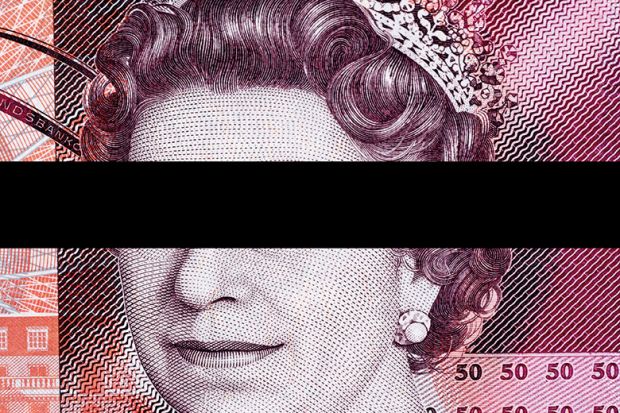High pay at both the BBC and universities hit the headlines during what passes for summer in the UK. And while the total remuneration of £451,000 earned by University of Bath vice-chancellor Dame Glynis Breakwell may be significantly less than the £2.2 million paid to disc jockey Chris Evans or the £1.75 million paid to football presenter Gary Lineker, the opprobrium that she received – particularly from Labour politician Lord Adonis – was every bit as sharp.
The government forced the BBC to reveal the salaries of all on-air personalities paid more than £150,000, while investigation into the number of university staff paid more than £150,000 (1,254 at just 29 universities, according to one exposé by The Sun) kept the university story rumbling. How preposterous for sports presenters or university human resources directors to be paid more than the prime minister, readers were invited to tut.
Discontent over the erosion of most workers’ pay in real terms creates a ready audience for such stories, and the increasing publication of salary data creates more opportunities for journalists to meet the desire.
In the US and Canada, publication of professors’ pay at state universities is routine. With Wikileaks and other data dump sites, not to mention state-ordered pay declarations, the old days of secrecy are pretty much over. In the UK, only vice-chancellors’ salaries have historically been known about, and typically seemed rather modest. However, professorial salaries at various institutions have also been revealed over the years. For instance, they were published at my institution, University College London, a decade ago. Only three bands were made public, but it certainly prompted reactions. It generated a discussion about whether academic pay should be discipline-specific, for instance. Should law professors be paid more than those in cultural studies, even if they have similar responsibilities, because law is more popular with students, or because a professor of law could earn much more as a practising lawyer?
But the experience was also very divisive. My department lost three of our best staff, and a number have remained disenchanted ever since. That is why talk of money is still taboo in many sectors. And it is why human resources wisely keeps a lid on it by talking about pay in very general terms; “a generous package”, “north of £200,000” and “commensurate with responsibilities” are examples of the preferred parlance used in job adverts.
Just after the First World War a big American company put out a “policy memorandum” entitled “Forbidding discussion among employees of salary received”. Hoping to avoid invidious comparison and dissatisfaction, it threatened to sack workers who disclosed their “confidential” salaries. The staff would have none of it. The next day, they walked around with large signs around their necks stating their exact salaries.
More modern studies show, surprisingly, that more senior workers prefer pay secrecy. But the research suggests that they may be doing themselves a disservice. In 2007, for instance, a group of business academics looked at the costs and benefits of pay secrecy. Their paper, “Exposing Pay Secrecy”, published in the Academy of Management Review, reported many problems with the practice. Employee perceptions of unfair pay were heightened by the mistrust and anxiety caused by secrecy. And hiring, firing and staff perks are not always seen as equitable when an opaque pay policy, however fair, is in place.
Yet pay secrecy also offers advantages to organisations. It can enhance control and reduce conflict. Pay differentials cause jealousy, so, where they exist, hiding them may prevent problems in esprit de corps , as well as stem the rise of “political” behaviour, such as union involvement and industrial conflict. Openness is both economically inefficient and likely to cause conflict.
Most pertinently for higher education, secrecy benefits teamwork, particularly in competitive cultures, by encouraging interdependence rather than what the paper’s authors refer to as “superstardom”, where particular individuals are known to be on vastly higher salaries than everyone else. The authors add that employees are generally in favour of secrecy because secrecy is really just another word for privacy. People do not want their salaries discussed by their co-workers.

It is a major source of astonishment to many people in the UK that in Norway, where I am an adjunct professor, you can look up everybody’s tax returns. Hosting a dinner party? One of the really fun activities is to establish the real salary-based pecking order of your guests. But a new law has been passed allowing people to know who has looked them up, aimed at discouraging jealousy and snooping. And the whole thing is socially sustainable only because Norway has an egalitarian culture and a relatively flat pay structure, both inside and outside the university.
This illustrates that the cost-benefit ratio of pay secrecy depends on factors such as the history and pay culture of the organisation, sector or nation. For an institution, it also depends on whether accurate, up-to-date industry compensation norms exist. Knowing how their salaries compare against the average for a senior partner in a law firm, a senior nurse or a store manager is important for organisations in those sectors when deciding whether to introduce pay transparency.
So how should such transparency apply to higher education, and how far should it go? Another unusual aspect of working at a Norwegian university is that you are paid for your publications. Various lists of acceptable journals, supposedly based on their quality, are distributed, and academics receive an annual salary increment based on the papers that they have published in them, taking into account the number of authors on the papers, and the journals’ prestige. It amounts to a nice, albeit heavily taxed, annual bonus.
This mechanism is very transparent, but does it make the staff happier or more productive? It certainly makes you focus on certain journals; I have changed my target publication venue twice for filthy lucre. But I don’t think it has made me – or anyone else – more productive. Indeed, the idea flies in the face of all the literature on intrinsic and extrinsic motivation. A system of rewards changes how people look at their jobs and makes them more money-conscious. But it seems odd to research and publish for money. Are there not many more powerful – egocentric, as well as noble – motives?
Many argue that pay transparency has another great pitfall: its tendency to drive up salaries. In academia, particularly research, there is a world market in which top talent can and will move institutions for better packages. This is why King’s College London fought and eventually won a costly legal battle to overturn a ruling by the UK’s Information Commissioner in 2014 that would have forced it – and, potentially, other British universities – to disclose the job title, department and salary band of the 125 of its staff then earning above £100,000 a year. The head of human resources at King’s argued that it might make it hard to lure staff from the private sector if they knew their salary would be made public, while current staff might demand pay hikes if they knew what their counterparts at other universities earned. One staff member at King’s claimed in evidence that he feared “unfair commentary in the press” if his salary was known, while “his children may be taunted by other children whose parents earn more or less than he earns”.
But are academic jobs directly comparable to those in the private sector? It has long been asserted that because the former are so intrinsically satisfying they need much less extrinsic reward. At the top end, heading up a great university was historically seen as an honour in itself, aside from the chance of bagging an OBE or even a knighthood. Academics further down the pay chain also admit to trading off salary for autonomy. If you accept Karasek’s demand-control model of occupational stress, you can see that while academics have high demands on them from their employers, they also have high levels of control over their syllabi and the topics they choose to write about. Most are relatively free of so-called presenteeism, not having to “check in” to the office. Some still have sabbatical rights. And many do consulting of one sort or the other. They rejoice, more than others, in being captains of their ship and masters of their fate.
However, these precious liberties are being significantly and systematically eroded, and the trade-off is looking less attractive. Fee-paying students demand better value for money while academics have less support and fewer facilities to cope with their demands. Administrators increasingly think about universities as businesses, with all facilities costed. Business schools have operated this way for years, but their staff are generally paid much more than regular academics.
All of these changes, inevitable as they probably are, have led academics to compare themselves with others: often old friends, who entered different professions. Their lives seem similar, but their rewards far less so.

Yet academics who see themselves in more mercantile terms and want greater pay transparency must ask themselves whether they also want the new tranche of performance management that would doubtless accompany it. Institutions would start comparing staff on various parameters, such as time, money, quality, quantity and feedback, but this would introduce the problem of how to devise metrics that don’t distort behaviours and that measure the contribution of others – teams – to productivity.
Pay transparency, however, is not all-or-nothing. There is a continuum from complete secrecy to complete openness. The BBC opted to put the 96 personalities paid more than £150,000 in bands, and I think it would be best if universities took a similar approach. For instance, they could augment the current reporting of the number of people earning more than £100,000 by also reporting the number earning £75,000-£100,000.
Pay secrecy is not just a question for vice-chancellors or millionaire disc jockeys. It relates to organisations’ vision and values, as well as individuals’ motivations. As the BBC is finding, once you have introduced transparency, the path back is near impossible – but if competitors have openness and you still have secrecy, they might undermine your system if some of your employees start to see themselves as underpaid.
Most importantly, if you wish to make salaries transparent, it is crucial that differentials can be justified. “Putting the injustices right” is a vastly expensive and political business. Consider the gender-gap problem, which was highlighted particularly starkly by the BBC pay data. Is this best solved by men taking a cut in their salary, or by women getting more?
In the case of universities, they need to give a robust rationale for putting people in the various pay bands they report, and start the long and difficult business of seeing whether the top earners do indeed meet those criteria. Indeed, this must happen regardless of whether they intend to introduce more transparency. For, whether universities like it or not, there will undoubtedly be more disclosures, more unhappiness and more embarrassment over pay to come.
Adrian Furnham is professor of psychology at University College London and an adjunct professor of management at the Norwegian School of Management in Oslo.
Register to continue
Why register?
- Registration is free and only takes a moment
- Once registered, you can read 3 articles a month
- Sign up for our newsletter
Subscribe
Or subscribe for unlimited access to:
- Unlimited access to news, views, insights & reviews
- Digital editions
- Digital access to THE’s university and college rankings analysis
Already registered or a current subscriber? Login




